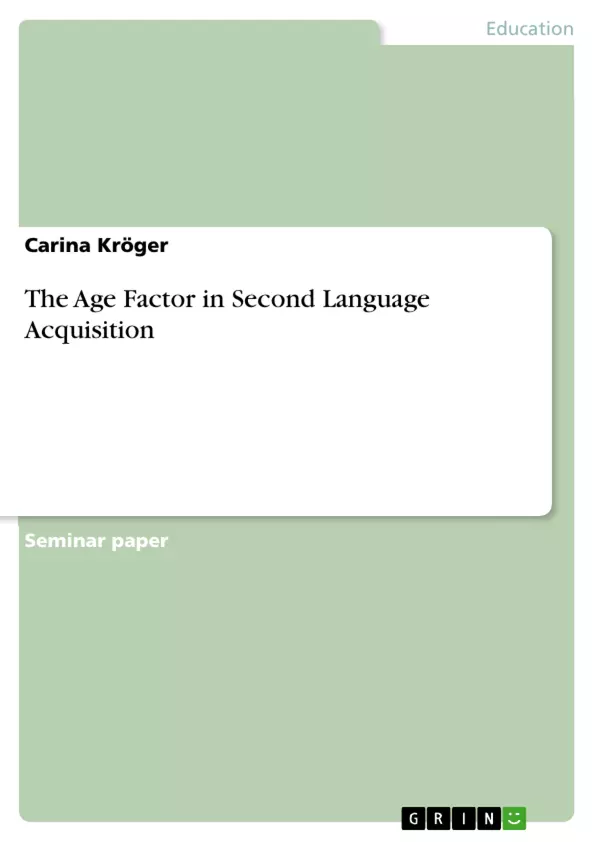This term paper will focus on the discussion of the putative maturational constraints for second language acquisition. The age factor is an aspect of first and second language acquisition research which has engendered very much controversy. In the discussion about age-related effects on language acquisition, one can find disagreements as to both the facts and to their possible explanations. The different points of view range from the notion that young learners are in all aspects of language learning more efficient and achieve better results, to the contrary position that older learners are the better learners.
In this paper, four of the positions concerning the age factor, which have been listed by Singleton, will be presented because they provide a good overview of the different views on this topic and the respective evidence belonging to them. Many of the differences in the results of various studies are due to the differences in how the results are elicited. The experimental design plays an important role for the outcomes.
Inhaltsverzeichnis (Table of Contents)
- Introduction
- Critical Period Hypothesis
- Age and First Language Acquisition
- Age and Second Language Acquisition
- Positions
- Younger learners are the more successful learners
- Older learners are the more successful learners
- Younger learners are better in some respects.
- Younger learners are better in the long run
- Learner Characteristics: Younger Learners vs. Older Learners.
- Input
- Early Second Language Learning
- Conclusion.....
Zielsetzung und Themenschwerpunkte (Objectives and Key Themes)
This term paper aims to explore the impact of age on second language acquisition, focusing on the debate surrounding the Critical Period Hypothesis (CPH). The paper examines different perspectives on the age factor, analyzes the characteristics of younger and older learners, and discusses the role of input in second language acquisition.
- The Critical Period Hypothesis and its impact on second language acquisition.
- Different positions on the age factor and the evidence supporting them.
- Characteristics of younger and older learners and their influence on language acquisition.
- The role of input in second language acquisition and its implications for different age groups.
- The practical implications of the age factor discussion for early foreign language instruction.
Zusammenfassung der Kapitel (Chapter Summaries)
The Introduction presents the topic of the paper and outlines the different perspectives on the age factor in second language acquisition. It highlights the controversy surrounding the CPH and the various explanations for its existence.
The section on the Critical Period Hypothesis examines the concept, its history, and the different interpretations of its scope and timing. It discusses the neurological explanations for the CPH and analyzes the various arguments for and against its validity.
The chapter on Age and First Language Acquisition provides a brief overview of the debate surrounding the CPH in the context of first language acquisition. It explores the various viewpoints on the possible onset of the CP and the evidence supporting these views.
Schlüsselwörter (Keywords)
Second language acquisition, Critical Period Hypothesis, age factor, language learning, younger learners, older learners, input, early foreign language instruction, learner characteristics, neurolinguistic explanations, cognitive factors, affective-motivational factors, sensitive period, lateralization, plasticity, localization, native-like accent, morpho-syntax, lexis, pragmatics, phonetic/phonological competences.
Frequently Asked Questions
What is the Critical Period Hypothesis (CPH) in language learning?
The CPH suggests that there is a specific window of time (maturational constraints) during which language acquisition occurs most easily and beyond which it becomes much more difficult to achieve native-like proficiency.
Are younger learners always better at acquiring a second language?
The paper presents multiple positions: some argue younger learners are more efficient overall, others suggest they are only better in the long run or in specific areas like accent, while some evidence shows older learners can be more successful in formal settings.
What roles do cognitive and affective factors play in the age debate?
Cognitive factors (like analytical skills in older learners) and affective-motivational factors (like lower inhibition in younger learners) significantly influence how different age groups approach language learning.
How does neurological development affect language acquisition?
The paper discusses neurolinguistic explanations such as lateralization, brain plasticity, and localization, which are often cited as reasons for the decline in language learning efficiency as a person ages.
What is the importance of "input" in this discussion?
The type and quality of input available to learners are crucial. Differences in study results are often attributed to how input is provided and how language performance is elicited in experimental designs.
- Quote paper
- Carina Kröger (Author), 2008, The Age Factor in Second Language Acquisition, Munich, GRIN Verlag, https://www.grin.com/document/346277



